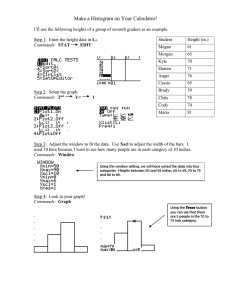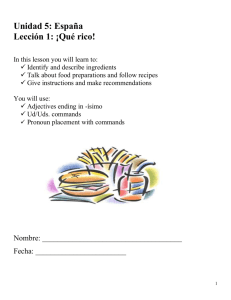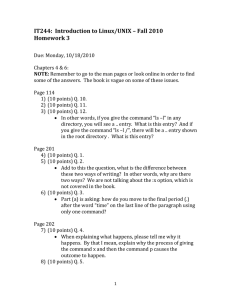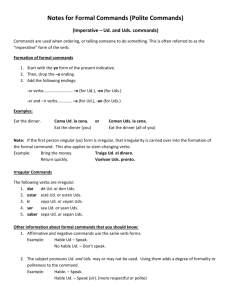sp 2 Commands
advertisement
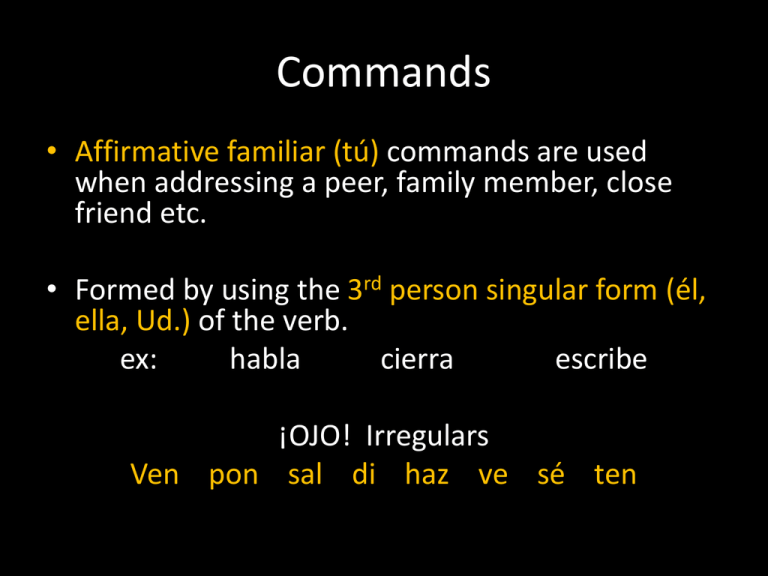
Commands • Affirmative familiar (tú) commands are used when addressing a peer, family member, close friend etc. • Formed by using the 3rd person singular form (él, ella, Ud.) of the verb. ex: habla cierra escribe ¡OJO! Irregulars Ven pon sal di haz ve sé ten Commands • All pronouns are attached to affirmative commands. Ex: *Lávate Wash dime Tell me dáselo Give it to him *Reflexive pronouns will agree with the type of command being used. (Tú command…… te) Give the affirmative familiar (tú) command 1. Preguntarle 2. Irse 3. Comenzar (ie) 4. Aprenderlo 5. Hacerlos 6. Cerrarla 7. Venir 8. Ser 9. Bailar 10. decirle Commands • Ud. Commands are used to address people you treat formally. (Mr./Mrs.) • Uds. Commands are used with more than one person. • They are formed by following the rule, Yo drop the “o” opposite ending. Hablar Hable Ud. Hablen Uds. Cerrar Cierre Ud. Cierren Uds. Salir Salga Ud. Salgan Uds. ¡OJO! *Irregular yo forms * The czar….. with the GERMAN C—qu Buscar g—gu Pagar z—c Empezar busca paga empieza busque Ud. Pague Ud. empiece Ud busquen Uds. paguen Uds. empiecen Uds. **g—j Coger coge Coja Ud. cojan Uds. ¡OJO! Irregular verbs (cannot drop “o” from Yo form) Ir Ser Ve Sé Vaya Sea Vayan Sean Saber Sabe Sepa Sepan Dar Da Dé Den Estar Está Esté Estén Remember! Pronouns are attached to affirmative commands. Reflexive pronouns will agree with the type of commands being used. Siéntate **Sentarse Siéntese Ud. Do it! ¡Hágalo! Siéntense Uds. Tell me! ¡Díganme! Práctica Give the correct command form. tú Ud. Uds. Cerrar Apagar Conducir Divertirse(ie) Servirle(i) cierra cierre cierren apaga apague apaguen conduce conduzca conduzcan diviértete diviértase diviértanse sírvele sírvale sírvanle Conversación Hijo/Hija, ven aquí y ayuda por favor. Espera un minuto Mamá/Papá. Estoy leyendo mi libro. Por favor, lava los platos y limpia tu cuarto. Pero, quiero leer. Puedes leer más tarde. Sí Mamá/Papá Gracias hijo/hija. Conversación Child, come here and help please. Wait a minute, Mom/Dad. I am ____________. Please wash _______and clean __________. But I want to ___________. You can __________ later. Yes Mom/Dad. Thank you son/daughter. Translate into English 1. 2. 3. 4. 5. Lávate las manos. Traigan Uds. tus libros a clase. Ten un buen día. ¡Salga Ud. ahora! Denme la tarea. Nosotros Commands Nosotros commands are used when you want to say “Let’s”. Also formed by following the rule, Yo drop the “o” opposite ending. Ex: hablemos salgamos paguemos Irregular Yo ¡OJO! The czar……….. seamos **irregulars Vamos Stem changing verbs for Nosotros ar/er verbs no stem change for nosotros “ir” verbs change for nosotros “e” to “i” and “o” to “u”. (just like we saw for the preterit) Volver pedir cerrar despertar volvamos pidamos cerremos despertemos dormir durmamos ¡Acuérdense Uds! All pronouns are attached to affirmative commands. Ex: *Lávate Vayanse *Lavémonos *Reflexive pronouns will agree with the type of command being used. (te, se, nos) *Drop the final “s” for nosotros commands when adding the pronoun “nos”. Ejemplos tú Cerrarla Oirle Servirles Irse Buscarlo cierrala Ud(s) Cierre(n)la nosotros cerrémosla oyele Oiga(n)le oigámosle sirveles Sirva(n)les sirvámosles vete Váya(n)se búscalo Búsque(n)lo vámonos busquémoslo Negative Commands ALL negative commands follow the rule, Yo drop the “o” opposite ending. (no) salga Ud. (no) cierren Uds. (no) seamos ¡OJO! Watch out for negative tú commands! di habla haz escribe No digas No hables No hagas No escribas Negative Commands All pronouns must come before negative commands. Ex. Dígame Lavémonos No me diga No nos lavemos But: Vámonos No nos vayamos Lávate ** No te laves Put the following commands in the negative form 1. 2. 3. 4. 5. Escríbela Vayanse Uds. Démelo Ud. Levántate Póngase Ud. el abrigo. Which command would you use? 1. Tell your boyfriend/girlfriend, “Go away” IRSE Vete 2. Tell your child, “Practice the piano.” PRACTICAR Practica 3. Tell your friends, “Come to my house at 9”. VENIR Vengan 4. Tell your friends, “Let’s tell the teacher”. DECIR Digamos 5. Tell your Mom, “Don’t wake up early tomorrow.” DESPERTARSE(IE) No te despiertes 6. Tell your brothers and sisters, “Don’t be bad”. SER No Sean

